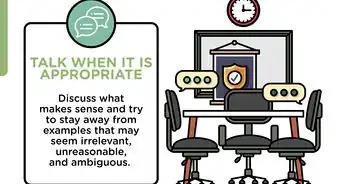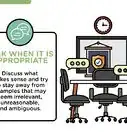This article was co-authored by Candice Mostisser. Candice Mostisser is a Dating Coach for NYC Wingwoman LLC, a date coaching service based in New York City. 'NYC Wingwoman' offers matchmaking, wingman/wingwoman services, 1-on-1 coaching, and intensive weekend bootcamps. She specializes in coaching others on best practices and strategies to succeed on first dates and in the online dating world.
This article has been viewed 170,055 times.
When you have been married for a long time, you may start to wonder what happened to the strong, communicative relationship you used to have. Perhaps you have endured too many fights and accusations that you don't listen anymore. There are steps you can take to regain your ability and desire to listen to your spouse.
Steps
Changing the Atmosphere for Better Listening
-
1Stop whatever you’re doing. If you aren’t looking at your spouse, you aren’t giving them your full attention. Put down the iPhone or computer and turn off the TV. It’s nearly impossible to pay adequate attention to someone when our attention is divided.[1]
-
2Look at them when they talk. Making eye contact with your spouse lets them know that you are focused on them alone and ready to listen. Your facial expression matters, too. Don’t scowl at them or roll your eyes when they begin speaking.[2]Advertisement
-
3Don’t interrupt your spouse. Often, we think we are listening to our spouse, when we are busy crafting our response or argument in our heads. This is not good listening because you’re only partially hearing your spouse because your main focus is on what you’re planning to say next. This leads us to jump into the conversation, usually before it’s our turn to speak. Few things are more detrimental to a spouse who needs to feel that they’re being heard than being repeatedly cut off mid-sentence by their partner.
- To be a good listener, it's important to avoid dominating conversations. This is related to not interrupting and might seem obvious, but often couples begin to struggle with this concept over time: you can’t be listening if you’re speaking. Be patient and allow your spouse as much time as they need to talk or vent to you.[3]
-
4Dedicate time each day to talk. Everyone feels busy and overextended at times between work, school, and family obligations. However, it is important to carve out even ten minutes a day to sit with your spouse and talk. The benefits of this are twofold. First, if you mention to your spouse that you want to prioritize talking to them, then that shows that you care about your relationship and are willing to be proactive to help improve it. Secondly, the ten or more minutes you set aside will help your overall communication if you use the time to give each other a “status report” on your days and how you’re both feeling.
- Try to ensure that your discussions are productive. Don’t use this private time to complain that the house is dirty, even if it is. Use this time to talk about a tough project at work or an upcoming event you both have, for example. Then be sure to ask your spouse how their day went and actively listen to them.
- If you have truly opposite schedules that make this difficult, then you might try Skype or FaceTime as ways to still communicate with each other.[4]
Listening Actively
-
1Pay attention to non-verbal cues. Making yourself appear to be open to listening to your spouse is almost as important as the actual listening. Are you fidgeting, standing with your arms crossed, or sighing? If so, you’re clearly communicating to your spouse that you are not listening and not interested in what they have to say. Sit upright or stand facing them and maintain eye contact. Think about how you would position yourself if your boss was speaking to you about something important and extend your spouse those same courtesies.
-
2Be sure you know exactly what your spouse is saying. To ensure you’re following what your spouse is saying, you need to reflect what they’re saying back to them. This doesn’t mean repeating verbatim exactly what they just said to you. It simply means listening for content and then zeroing in on key facts that show your partner that you were listening.
- For example, if your spouse tells you that they are stressed out over a major project at work, you might say something like “That project sounds intense, and it definitely makes sense that you’re stressed. Is there anything I can do to help?” By saying this, you are reflecting back and validating their feelings, acknowledging that you heard them about their concerns, and then gently offering your help.
- Feel free to ask follow-up questions during a break in the conversation! This is a great way to show that you're playing close attention.[5]
-
3Empathize with them. Try to understand where your spouse is coming from, especially if they are voicing a complaint. Make an effort to understand their frustration. If they are complaining that the kitchen is filthy, for example, then think about their complaint. Is the kitchen dirty? Think about ways to address their complaints that show that you’re truly hearing them. Even if you feel like they’re overreacting, try to find the truth in what they’re saying.[6]
-
4Listen for ways you can agree. If your spouse voices a concern, try to find common ground on the issue. Even if you think their concern is an overreach or isn’t really valid, there is usually at least a nugget of truth in their problem, if you objectively examine the situation. Finding ways to validate your spouse’s concern shows both that you are listening and that you care about what they’re saying. At minimum, you're always able to acknowledge that your spouse feels a certain way, and that matters to you in and of itself, even if you don't agree with the logic behind the feeling.
- For example, if they comment that you never help get the kids ready for bed, then you might reply that you understand where they’re coming from and volunteer to take over bedtime duties that night. You might follow up by asking if the two of you can sit down and determine a schedule or delegate duties that might help make bedtime duties not fall to just one person all the time.
-
5Don’t one-up their concerns. If your spouse opens up to you about a problem, avoid the urge to invalidate their worries by trumping their concerns with something bigger going on in your life. This sends the clear message to your spouse both that you aren’t really listening to them and that you also don’t consider their feelings and problems important. Remember that problems and stressors are not competitions. A good listener will hear out their spouse’s concerns and wait their turn to separately mention their own issues.
Working on Yourself
-
1Drop your agenda. Have an idea of what direction you want your conversation with your spouse to go? If you want to embrace being a good listener, you have to get rid of it. Conversations in which two people are participating equally by listening and replying grow organically. Don’t sit down to listen to them with an expectation of guiding the conversation your way. When you do this, you aren’t truly listening.
-
2Don’t feel like you have to fix their problem. Sometimes our spouses simply want to come to us to vent or talk through their problems. When you step in with unsolicited, quick-fix suggestions, this belittles your spouse and minimizes their concerns. Avoid offering advice unless your spouse specifically asks you what you think.
- This especially applies to men. This tends to be a very gendered problem, with husbands seeking to fix their wives’ problems, rather than listening to their wives talk about their problems. For instance, if your wife comes to you with concerns about a disagreement she had with her mother, resist the urge to tell her to simply call her mother and apologize. Instead, actively listen and acknowledge her struggle.
-
3Remember the importance of being a good role model. The way that you and your spouse communicate and listen to each other will be the model for your kids in their future relationships. Children are sponges for information, so make sure that the model that you’re providing them about how to best communicate with their partner is one of respect and openness.
-
4Avoid being defensive about past poor-listening. Your spouse might bring up that you haven’t listened to them in the past. When they mention this, it’s important to not become defensive or angry. Instead, acknowledge that you haven’t been as attentive as you should have been and that you’re working on it. Try asking them what things you specifically do that make them feel that you aren’t listening. This way, if they have specific examples, you’ll have concrete things that you can begin to work on.
-
5Apologize and mean it. If you’ve been neglectful of your spouse in the past and failed to listen to them, then a genuine apology can go a long way. Be sure that your attitude is remorseful and matches your words. Avoid sarcastic or passive-aggressive comments that can seem more like a veiled attack than a genuine apology.
- Try saying something like “I know that I haven’t been listening to you. Let’s set a date to go get coffee or lunch/dinner and talk. I want to know what’s going on in your life.” Then be sure to follow up and set concrete plans by picking a date, location, and securing a babysitter (if needed).
-
6Ask for feedback. Ask your spouse if they feel like you listen to them. You need to be prepared for their answer. Ideally they will say yes, but if they are hurting they might not be kind in their response. Asking them whether they feel like you listen to them can be tough, but it is your most effective means to gauge their perception of how well you listen.
-
7Try marriage counseling. If things aren’t working despite your best efforts to become a better listener for your spouse, then you both might benefit from speaking with a professional. Find a trusted therapist or member of the clergy, and speak with them about your listening and communication related marital problems. They are trained to help couples in this area, and this can be helpful when managing the issues on your own have failed.[7]
References
- ↑ http://psychcentral.com/lib/attention-couples-becoming-a-skilled-listener-and-effective-speaker/
- ↑ http://psychcentral.com/lib/attention-couples-becoming-a-skilled-listener-and-effective-speaker/
- ↑ http://psychcentral.com/lib/attention-couples-becoming-a-skilled-listener-and-effective-speaker/
- ↑ http://www.cnet.com/news/skype-helps-keep-half-of-long-distance-relationships-alive-survey-says/
- ↑ Candice Mostisser. Relationship Coach. Expert Interview. 24 January 2020.
- ↑ https://www.psychologytoday.com/blog/fulfillment-any-age/201203/11-ways-active-listening-can-help-your-relationships
- ↑ http://www.goodtherapy.org/learn-about-therapy/issues/communication-issues













































































